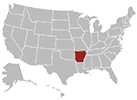
procedures, then becoming a Sterile Processing Technician (SPT) might be the perfect job for you.
In Arkansas, SPTs play a vital role in ensuring the safety of patients by sterilizing surgical instruments and making sure they are ready for use in the operating room.
In this article, we’ll discuss the steps to becoming an SPT in Arkansas, available schools in the state, salary expectations, and answer some frequently asked questions.
Page Navigation
Steps to Become a Sterile Processing Technician in Arkansas
Meet the minimum requirements
To become an SPT in Arkansas, you must have a high school diploma or GED equivalent.
It’s also helpful to have a strong background in science, particularly in biology and chemistry.
Complete a Sterile Processing Technician training program
The next step is to enroll in an accredited SPT program that includes both classroom and clinical training.
These programs are available at community colleges, vocational schools, and universities.
You can choose to complete a certificate program or an associate degree program.
The curriculum will cover topics such as anatomy and physiology, microbiology, infection control, and sterilization techniques.
Programs typically last between 6 months to 2 years, depending on the program’s length and the institution you choose.
Gain hands-on experience
After completing your training program, you’ll need to gain hands-on experience by completing a clinical externship or internship.
This will provide you with valuable experience working in a hospital or clinical setting.
During your externship or internship, you will work alongside experienced SPTs and learn how to properly handle, clean, sterilize, and store medical instruments.
Obtain certification
While certification is not required to work as an SPT in Arkansas, it is highly recommended.
The most commonly recognized certification is the Certified Registered Central Service Technician (CRCST) certification, which is offered by the International Association of Healthcare Central Service Materiel Management (IAHCSMM).
To obtain this certification, you must pass an exam that tests your knowledge of sterilization techniques, infection control, and medical terminology.
Other certifications include the Certified Sterile Processing and Distribution Technician (CSPDT) certification offered by the Certification Board for Sterile Processing and Distribution (CBSPD).
To be eligible for these certifications, you will need to meet certain requirements, such as completing a training program and having a certain amount of work experience.
Apply for jobs
Once you’ve completed your training and certification, you can start applying for SPT positions in Arkansas.
Job opportunities may be available in hospitals, clinics, surgery centers, and other healthcare settings.
You may also consider joining a professional organization such as the Arkansas Healthcare Association (IAHCSMM) to network with other professionals and stay up-to-date on industry trends and best practices.
Sterile Processing Technician Schools in Arkansas
If you’re looking for schools offering SPT programs in Arkansas, you’re in luck!
Here are some of the schools in the state that offer SPT programs:
Northwest Arkansas Community College

Located in Bentonville, Arkansas, this college offers a one-year certificate program in Sterile Processing Technology.
The program costs approximately $5,800 for in-state tuition and fees.
University of Arkansas
![]()
Located in Fayetteville, Arkansas, this university offers a two-year associate degree program in Sterile Processing Technology.
The program costs approximately $9,000 for in-state tuition and fees.
Baptist Health College Little Rock
![]()
Located in Little Rock, Arkansas, this college offers a one-year certificate program in Sterile Processing Technology.
The program costs approximately $10,000 for tuition and fees.
Sterile Processing Technician Schools in Arkansas – Summary Table
Top 3 Schools in Arkansas
| School Name | Address |
|---|---|
| Northwest Arkansas Community College | 1 College Dr, Bentonville, AR 72712, USA |
| University of Arkansas | Fayetteville, AR 72701, USA |
| Baptist Health College Little Rock | 11900 Colonel Glenn Rd, Little Rock, AR 72210, USA |
Salary
According to Salary.com, the average salary for an SPT in Arkansas is around $36,000 per year.
However, this can vary depending on factors such as experience, location, and certification.
Annual Salary Range:Average Salary of Sterile Processing Technicians in Arkansas
| City Name | Salary |
|---|---|
| Little Rock | $35,250 |
| Fort Smith | $33,340 |
| North Little Rock | $35,250 |
| Fayetteville | $34,770 |
| Jonesboro | $35,100 |
| Pine Bluff | $34,160 |
| Springdale | $34,770 |
| Conway | $34,900 |
| Rogers | $34,570 |
| Jacksonville | $35,200 |
Regional Salary in Arkansas
| Region | Employed | Avg. Annual Salary | Avg. Hourly Pay | Top 10% Annual Salary | Bottom 10% Annual Salary |
|---|---|---|---|---|---|
| Fayetteville-Springdale-Rogers, AR-MO | 60 | $39,900 | $19.18 | $48,500 | $34,350 |
| Fort Smith, AR-OK | 30 | $36,190 | $17.4 | $40,290 | $31,800 |
| Little Rock-North Little Rock-Conway, AR | 220 | $36,320 | $17.46 | $39,450 | $33,050 |
* Employment conditions in your area may vary.
Frequently Asked Questions
What is the job outlook for SPTs in Arkansas?
The job outlook for SPTs in Arkansas is positive.
According to the Bureau of Labor Statistics, employment of medical equipment preparers (which includes SPTs) is projected to grow 6 percent from 2020 to 2030.
How long does it take to complete an SPT program in Arkansas?
SPT programs in Arkansas typically last between 6 months to 2 years, depending on the program’s length.
What certification is required to work as an SPT in Arkansas?
Certification is not required to work as an SPT in Arkansas, but it is highly recommended.
The most commonly recognized certification is the Certified Registered Central Service Technician (CRCST) certification, which is offered by the International Association of Healthcare Central Service Materiel Management (IAHCSMM).
What are the annual fees for holding my license?
In Arkansas, SPTs are not required to hold a license, so there are no annual fees for holding a license.
However, it is important to maintain certification through continuing education and recertification requirements, which may involve additional fees.




